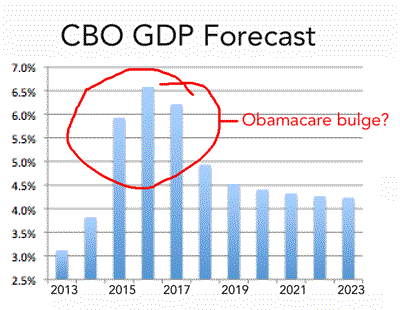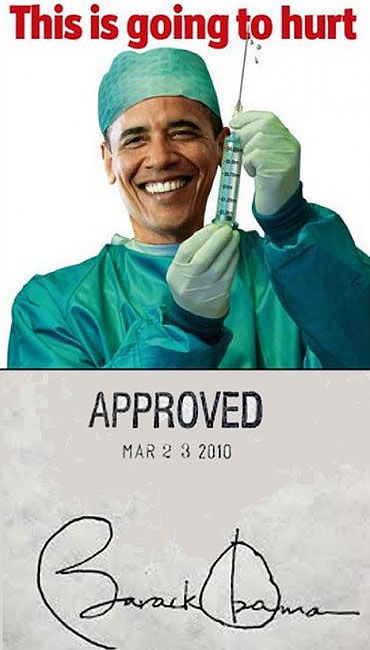The Congressional Budget Office put conservative economic thinkers on their ass this week. In this Report (pdf), the CBO concluded that the US budget deficit is about to collapse to insignificance. The improvement in the deficit outlook is so large that it has lead liberal thinkers to start calling for more stimulus spending. If it were not for the three scandals brewing for Obama (Benghazigate, IRSgate and APgate) I think there would be calls to spend some more government money.
The CBO assessment of the deficit profile relies on every trick in the book. The assumption is that all of the variables that weigh on the deficit will be improving over the next few years. Tax collections will remain at historically high levels. Government spending will decline as the economy improves. Fannie Mae and Freddie Mac will be kicking $95Bn into the coffers. Social Security will cost less than previously thought, the same favorable result is assumed for both Medicare and Medicaid. And of course, there will be no wars or military incursions that have to be paid for. But, by far, the biggest driver of the reduced deficits will come from a robust economic recovery that is set to occur. This is the CBO forecast for top line GDP growth:

Wow! 6.5% growth is coming our way! Don’t worry at all about the endless recession in Europe. Don’t consider the rapid slowdown in China either. And please don’t worry about the fact that the Fed is going to be taking its foot off the gas over the next 24 months – all that won’t make any difference. The USA is set for a spurt of growth not seen for years.
What could the CBO be hanging its hat on when making this bold predictions of rapid economic expansion? I wonder if the CBO is relying on Obamacare to provide the big boost. This is the only significant economic development on the horizon. It will change everything when it’s finally implemented. It will result in 32 odd million more people having access to healthcare. And when those people do have health insurance, they will be going to Doctors, getting treatments and medicines. And with those visits and related spending, the economy will get a lift – at least that is the thinking.
There is some evidence that Obamacare is going to ratchet up health spending. The New England Journal of Medicine has done a study on the results of an experiment in Oregon. Some 6,000 people were given access to Medicaid for two years. There was a control group of another 5,000 people who did not get access to health insurance. What did those who won the lottery for the free health benefits do? They went to Doctors of course. The study showed that those with insurance were 2Xs more likely to visit a doctor, and would take twice as many prescription drugs. Obamacare will result in an increase in medical diagnostics; the number of MRI’s, X-rays, blood test etc. will increase markedly when free health insurance is available. The cost of all these new medical services will add to GDP, and increase employment in healthcare.
The Oregon study showed that healthcare spending rose by $2,750 for those who had access to Medicaid versus the control group. If these results are applied to all of the 32m people who have no insurance today, it would result in an increase in spending of $90Bn – that comes to 5.5% of GDP. While not all of that spending is going to happen, its pretty clear that Obamacare is going to ramp up the economy by a meaningful amount – a 2% net increase in economic activity is possible.
To the extent that Obamacare is measured as a jobs program it may be considered a “success”. More medical spending will be the result. The larger question of what it will do for the health profile of Americans is not at all a sure thing. I was surprised by the conclusions drawn by the Oregon study:
This randomized, controlled study showed that Medicaid coverage generated no significant improvements in measured physical health outcomes in the first two years
The reason why overall health results were not improved for those with insurance was interesting. People who have healthcare available to them often adopt risky behavior. For example, those who had health insurance in the Oregon study were much much more likely to smoke. (10% increase over those that did not have health insurance) This conclusion confirms what has been observed in other situations. When people have seat belts, they think they are safe, so they drive faster. It appears that the same holds true on health related matters.
The pessimist in me says that the roll-out of Obamacare is going to be anything but a success. The state insurance exchanges will not be up and running on time. Getting those 32m people to sign up for Medicaid will not happen at the pace that is currently anticipated. Obamacare will not be the economic stimulus that is hoped for, it won’t improve the nations health levels by much, and it’s going to cost an absolute bundle in the form of increased taxes. My guess is that in 2-3 years most folks in the country are going to hate Obamacare, but it it will be impossible to get rid of by then.




Since when is $90 billion 5.5% of the GDP. Your math is sloppy. Also, you wrote that the two-year Oregon experiment led to recipients spending $2,750 per capita more than non-recipients. Is that annually, or over the two-year period of the study? I assume annually. But that doesn’t make your writing any less sloppy than your math. If the $2,750 figure represents one year (as I assume; it’s unclear), then that extrapolates out to less than 1% of the GDP, not 5.5%. If, alternatively, the figure represents two years, then that extrapolates out to less than 1/2 of 1% of the economy–not 5.5%!